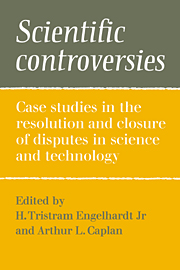 Scientific Controversies
Scientific Controversies Published online by Cambridge University Press: 03 February 2010
It is generally presumed that whatever merits or demerits the judicial process may otherwise possess, that process is superior to scientific debate as a process of obtaining closure in that it provides a precise, definite, and final conclusion to any controversy, within a defined time, and according to a generally understood and formally delineated procedure. It is for this reason that plaintiffs seek resolution of disputes through litigation rather than through academic debates, constitutional conventions, or the vagaries of some other less well-defined processes. The notion that a lawsuit will inevitably lead to the formal resolution of any scientific issues that litigants place before the court is, however, fanciful. It supposes a very narrow view of judicial conduct and the judicial decision-making process: It assumes that the court can, and will, weigh scientific arguments that are cast in an adversary model and then simply declare a winner.
As others have suggested, such a model would not provide an adequate way to resolve scientific disputes, even if the judiciary were willing to undertake such efforts. Fortunately, the courts have generally recognized their inability to impose solutions to scientific questions. Instead the American judiciary has generally perceived its role as one of maintaining the integrity of the technical decision-making process by requiring those institutions better able to resolve matters of science to do the careful and adequate scientific work necessary for their resolution.
In participating in the Laetrile debate, the courts have been accused of attempting to step beyond the natural limitations of their competence and to resolve a scientific dispute.
To save this book to your Kindle, first ensure [email protected] is added to your Approved Personal Document E-mail List under your Personal Document Settings on the Manage Your Content and Devices page of your Amazon account. Then enter the ‘name’ part of your Kindle email address below. Find out more about saving to your Kindle.
Note you can select to save to either the @free.kindle.com or @kindle.com variations. ‘@free.kindle.com’ emails are free but can only be saved to your device when it is connected to wi-fi. ‘@kindle.com’ emails can be delivered even when you are not connected to wi-fi, but note that service fees apply.
Find out more about the Kindle Personal Document Service.
To save content items to your account, please confirm that you agree to abide by our usage policies. If this is the first time you use this feature, you will be asked to authorise Cambridge Core to connect with your account. Find out more about saving content to Dropbox.
To save content items to your account, please confirm that you agree to abide by our usage policies. If this is the first time you use this feature, you will be asked to authorise Cambridge Core to connect with your account. Find out more about saving content to Google Drive.